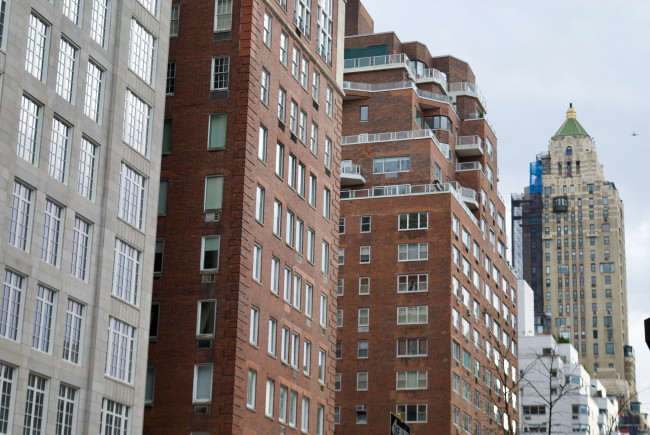Need a mortgage to buy a NYC apartment or house? Read these FAQs first
- Understand the differences between fixed-rate, adjustable, conforming, and jumbo loans
- New caps for conforming loans in 2023 means buyers can qualify for larger amounts at lower rates

There’s lots of jargon when it comes to mortgages and understanding the terminology will help when searching for the right loan.
iStock
If you’re looking to buy in New York City, chances are you need a mortgage to afford to buy a place. In most cases it works like this: You’ll need to put down at least 20 percent of the purchase price but the other 80 percent can be borrowed and paid back with interest over a period of time, usually 30 years.
This type of borrowing is available from mortgage brokers or bankers who will assess the risk you present as a buyer, offer a mortgage interest rate for the loan, and will require monthly payments from you for the life of the loan—unless you sell, in which case the bank will take what’s owed to them from the sale.
But that's not the only type of loan available, and there’s lots of jargon when it comes to mortgages. Understanding the terminology and what your options are will help when searching for a loan. Read on.
What is a mortgage?
Put simply, a mortgage is a loan that allows you to buy a property. Depending on the amount of money you borrow and who you borrow from, the loan will either be held by a bank or will be sold to investors as mortgage-backed securities.
A mortgage that’s held by the bank is called a portfolio loan because it becomes part of their portfolio of assets. A loan that’s sold is a non-portfolio loan and can be sold to government agencies like Fannie Mae and Freddie Mac, which are part of the Federal Housing Finance Agency.
What are the different types of mortgages?
When mortgage rates were low—as they were for years before and throughout the pandemic—the 30-year fixed mortgage was the go-to product for buyers. The rate doesn’t adjust so the payments are predictable and easier to budget for. The loan period is 30 years and over that time you pay back the principal you’ve borrowed as well as the interest on the loan.
Now that mortgage rates are rising, the adjustable rate mortgage or ARM, is becoming more popular. Unlike the fixed mortgage, the rate fluctuates with the market after a certain amount of time. A five- seven- or ten-year ARM typically gives you a lower initial interest rate and it stays at that level for the duration of the ARM, then adjusts based on the market every six months after that. This gives you at least a period of predictability. Once the ARM expires, you have an opportunity to refinance.
Another mortgage type is an interest-only loan. In this scenario, your monthly payments don't pay down the principal loan amount during the first 10 years. Interest-only loans often come with higher interest rates but the monthly payments will be lower. For more on this check out: “The 30-year, fixed-rate mortgage isn’t your only option. Here are 4 other types of loans to consider.”
What’s the difference between a conforming loan and a jumbo?
Conforming loans are smaller than jumbo loans. If the property you are buying requires you to get a loan that’s above the conforming limit, you need to take out a jumbo loan.
The conforming loan limit is capped by the FHFA and the amount adjusts each year. The maximum limit for conforming loans on one-unit properties in 2023 for high-cost areas like NYC is $1,089,300. For two-unit buildings the loan cap is higher at $1,394,775. Conforming loans often have lower mortgage rates than jumbos.
Jumbo loans aren’t backed by a government agency like conforming loans, which can be acquired by Fannie Mae and Freddie Mac. As with any financial product, factors that affect the risk also affect the rate. Jumbo loans typically have higher rates than conforming loans.
How much of a deposit do you need for a mortgage in NYC?
A bank wants to see that a buyer has skin in the game and often requires you to put at least 5 percent down. With a jumbo loan, you can only borrow 80 percent of the cost of the apartment so you’d need to put 20 percent down.
In NYC, most of the for-sale properties are co-ops where, as a buyer you become a shareholder rather than an owner. If you buy a co-op you need to make sure your lender understands how these work. NYC co-ops, which have strict financial requirements for buyers, often require you to put down at least 20 percent down or more, with some insisting on 50 percent down.
The amount of money you can borrow against the sales price of your new place is called the loan-to-value (LTV) ratio. Condo buildings in NYC often require at least 10 percent down. For more, read: “What’s the difference between getting a mortgage for a co-op and a condo?”
Mortgage broker or loan officer—what’s the difference?
A loan officer at a bank will offer you the bank’s rate and the bank’s products. In some cases these might be the best rates. The bank might encourage you to make deposits with them to lower your rate. This helps you because you want a low rate and it helps them, because they’ve got your business. A big retail bank can often hold your mortgage on its books and doesn’t need to sell it to investors so as a result they can offer lower rates.
However, mortgage brokers—as the name suggests—work with a variety of different financial institutions and can find the product and service to fit your needs. Mortgage brokers have more flexibility and in many cases better customer service but are not the best source for jumbo loans because these are not sold on the secondary market and mortgage brokers cannot hold the debt like a bank can.
Likewise, new construction loans are difficult for mortgage brokers unless 50 percent of the building is already sold. This is why developers often have preferred lenders who are prepared to offer mortgages while a condo is still under construction.
What are mortgage points?
This term is the shorthand for a strategy to prepay interest on the loan to lower your mortgage rate. Many lenders allow you to buy down your rate like this. A point typically costs around 1 percent of your mortgage, so on a $750,000 mortgage, a point would cost $7,500.
In a buyers market you might be able to negotiate with the seller or sponsor to buy down your rate in this way. This means they’d take money off the asking price so you could pay for points, thereby putting the apartment financially within your reach. Read: “What are mortgage points and how do they lower your interest rate?”
How do you get the best mortgage rate?
Jumbo loans typically have higher rates than conforming ones and your rate will vary depending on whether it’s fixed or adjustable. A few other factors play into getting the best mortgage rate.
Many borrowers protect their credit score to get a lower rate (so make sure you regularly pay off that credit card or store card). A score of 700 to 739 is considered good credit, above that is considered excellent.
Moving funds to a bank where you’ll take out a loan may also make you eligible for a rate discount. You might also consider buying points to lower your rate.
Can you negotiate a mortgage?
Mortgage rates are determined by the market but also the risk you present as a borrower. One way to negotiate the rate you’re offered is to get multiple quotes. The caveat here is that having a lender run your credit score multiple times can lower it. This is called a hard inquiry. Make sure it’s a soft credit inquiry requested by you, which doesn’t affect your score.
Better credit and a larger down payment can result in better rates and terms but there isn’t a huge amount of leverage for a borrower. However, there may be incentive programs for first-time buyers—or other categories of buyers like veterans—so make sure you ask if you qualify.
Can you negotiate the rate after locking?
As you approach the closing date for your purchase you’ll want to lock in the rate so you can anticipate your monthly payments. This is a rate lock and it typically lasts 60 days but you can negotiate a lock up to 90 days, particularly if it is a co-op where the closing might be delayed by a board.
If rates go down during that time, you may be able to work in a renegotiation to lower the rate, also known as a float-down option. This is something worth considering when the economy is unsettled—you are protected from a rate increase but can take advantage of a rate drop during the lock period.
If the rate lock expires, there are typically extension fees from the lender which can be paid out of pocket or be negotiated as a rate increase.
How long does it take to get a mortgage?
When you apply for a mortgage you need to supply your W2s, pay stubs, and bank statements. In most cases, once a lender has your paperwork, a mortgage application can be completed in a matter of minutes. After the pre-approval is issued, the next step is disclosures, getting an appraisal, and obtaining a title report so the deal can close. That could take a few weeks.
When you are offered a quote from a lender, make sure you know if it is with or without points—it sounds obvious but they may try to entice you with a lower rate that’s based on you buying points when you close.
The best scenario is to engage with a lender well in advance of your apartment hunt so they can better guide you through the process. This is especially the case if you are considering a co-op because you want your lender to understand how they work or better yet, specialize in these types of purchases.
Why would a mortgage be denied?
The obvious reason you’d be denied a mortgage is because you didn’t meet the financial requirements of the lender. This could be because you have a low credit score or your finances aren’t strong enough. This can be an issue for high net-worth retirees or people who are self employed. For tips check out these articles: “The self-employed New Yorker’s guide to getting a mortgage” and “How to get a mortgage in NYC when you are retired.”
Even if you have good credit and money in the bank, you might also have trouble getting a mortgage for an apartment if there are issues with the building. This could be a missing certificate of occupancy, a building with a low reserve fund, or problems with the title or liens. For more on this, read: “6 reasons your mortgage application might be denied or delayed that have nothing to do with you.”
Do I have to pay mortgage recording tax?
As infuriating as it may be, New York state has a tax on recording your mortgage and it is calculated as a percentage of the loan. If you borrow $500,000 or less, you are taxed at a rate of 1.8 percent of the loan. If you borrow more than $500,000, you pay 1.925 percent. (Both of these figures include a 0.5 percent state levy, and New Yorkers are entitled to a $30 discount on their payment.)
You only pay this tax on real property so co-ops are exempt. (With a co-op purchase you become a shareholder not the owner of a deed.)
For more, read: “What is a mortgage recording tax? Are there ways to reduce it?” The answer to that question is yes, you can reduce it in some circumstances by taking on the seller’s mortgage, if they have one. You can’t transfer your existing mortgage to a new property but by taking on the seller’s mortgage you enter into what’s called a consolidation extension and modification agreement or CEMA. In many cases, the savings can be considerable.
You Might Also Like



























